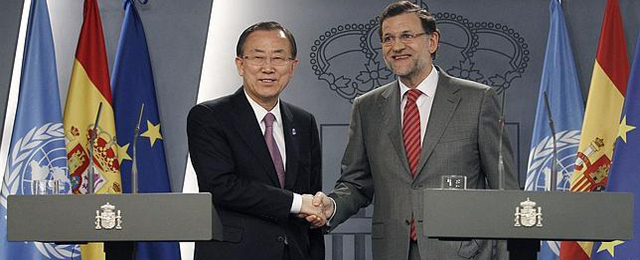“We have learned from the past and we know where we are heading to. We have a plan and we are determined to make it work. Spain is back,” Spanish Premier Mariano Rajoy said at New York’s Council on Foreign Affairs on Thursday.
His speech was one of the multiple contacts with American reporters and opinion makers that the Spanish leader had scheduled this week, including an interview with The Wall Street Journal and another with Bloomberg TV.
Mr Rajoy was in New York this week on the occasion of the United Nations’ General Assembly, where he pushed for a seat at the Security Council. However, the most important thing for him was to pass a clear message: the worst of the economic crisis in Spain is over.
“Today the debate is no longer about whether Spain will be rescued or if the euro has a future,” Rajoy said. “Spain is coming out of the recession and next year there will significant growth,” he told Bloomberg.
With much better numbers it is easier to refund the debate: Spanish exports are surging and the economy is expected to grow next year, despite the 26 percent unemployment rate. Risk premium is now lower than Italy’s.
As for the labor reform, Mr Rajoy said: “If it were necessary or useful to do a touch-up so that things worked better, have no doubt that we would do it.” However, he pointed out the government doesn’t plan additional austerity measures as believes this year’s deficit goal of 6.5 percent of GDP can be accomplished.
To Madrid’s thrill, media reacted to the PR campaign. Spain no longer made headlines because of a crippling crisis:
“Spain Emerges From Recession but Sees More Austerity Ahead,” reported the WSJ.
“Spain May Deepen Labor Overhaul to Reduce Jobless: Rajoy,” said Bloomberg’s piece.
Attempted influence
But at home Mr Rajoy did not get the same kind of headlines. In Bloomberg’s interview, the reporter asked him about the Bárcenas case, the ex-treasurer of Spain’s Popular Party who was charged with money laundering in a scandal that hits Prime Minister. Mr Rajoy said during the interview that he had no knowledge of whether party officials working for him destroyed evidence sought by the National Court as part of a corruption investigation.
Later, Rajoy’s advisers asked Bloomberg to omit that part of the conversation. The reporter refused to do so. The news quickly spread and stirred the debate in the Spanish media. The PM’s advisers didn’t comment on the incident but sources close to Bloomberg did confirm they had attempted to influence on their piece.
Greece is also in PR mood
The Spanish government is not the only EU’s peripheral that is trying to get some good comments. Greece’s deputy prime minister gave an exclusive interview to Reuters on Wednesday, in which he said the country does not require a third bailout and will possibly be returning to the bond market next year.






“a charming offensive”-muy encantadora? I think you mean a CHRAM offensive